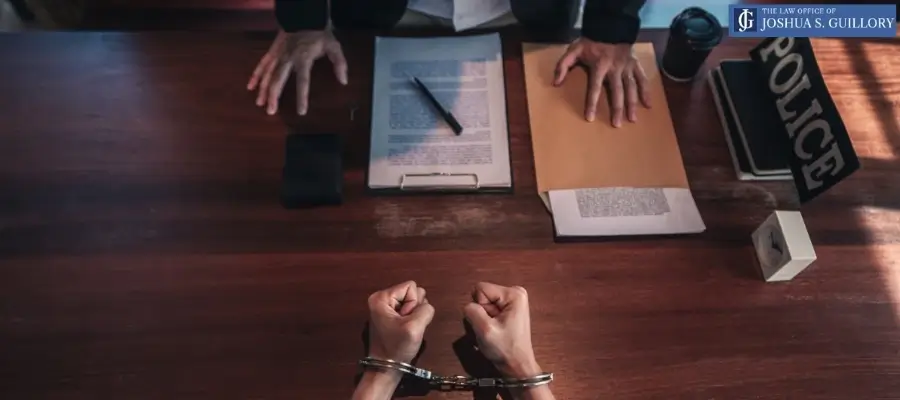|
|
Last Modified on Apr 22, 2025
When facing these allegations, many ask, “What happens when you’re charged with a felony in Louisiana?” A felony arrest puts your future at risk. Every decision from day one is important. Don’t fall behind before the fight begins. It’s important to know what to expect so that you’re not surprised.
Initial Arrest
Once the police make an arrest, they bring the person to jail for booking. This step includes documentation, like photos. The person gives their basic information. Officers may ask questions about the incident. Answering them is not required.
After booking, the person goes into a holding area. Some wait hours. Others wait longer. It depends on how quickly a judge becomes available. Jail conditions vary from parish to parish.
An arrest starts the felony process. The next steps usually happen within the next few days. The future hearing sets the path forward for the case.
Bond Hearing
The bond hearing is often the first time a person sees a judge after their arrest. This happens within three days unless delays push it back. At the hearing, the judge reviews the charges. They also read the person’s rights. However, this is not a trial. No evidence gets reviewed in full.
The judge decides whether to set bail. The bail amount is determined by the level of risk the defendant poses. Some people are denied. Others receive it under certain conditions, like monitoring their electronics. If the person can’t pay, they stay in jail until the case moves forward.
A criminal defense attorney can argue for a lower bond. They could even successfully advocate for release with no bond at all. That argument depends on the background of the defendant.
Formal Charges
Once charges are filed, the case moves to arraignment. This hearing is where the person hears the formal charges. They are asked to enter a plea. The most common pleas are guilty, not guilty, or no contest.
After this hearing, the case might enter the pretrial phase. The court can set additional dates for legal motions. This stage sets up the entire rest of the case.
Pretrial Process
The pretrial phase is where both sides prepare their arguments. The defense receives evidence from the state and vice versa. This process is called discovery.
During this time, a defense lawyer can file motions. Some motions ask to suppress evidence. Others may challenge how the arrest happened. Pretrial motions are often where significant issues come to light.
This phase also includes plea talks. The district attorney may offer a deal for reduced charges. The defense can negotiate this deal. Each decision shapes the risk of trial.
Trial
If the case is not resolved, it moves to trial. Most felony trials involve a jury. These trials can last from a few days to potentially several weeks.
The state presents its evidence first. The defense can cross-examine their witnesses. They can also present their own evidence. The jury then decides on the verdict. In a bench trial, the judge does the same.
If the person is found guilty, the court sets a sentencing date. The sentence can include many types of penalties, not just jail. If the person is found not guilty, the case ends, and the person walks free. This could open the case up to an appeal, depending on the circumstances.
Long-Term Effects of a Felony Conviction
A felony conviction carries more than just jail time. The consequences can last for years. The most common effects include:
- Voting rights: A person with a felony conviction loses the right to vote while in prison. They also cannot vote while on probation. This right might come back only after the full completion of a sentence.
- Firearm restrictions: Most felony convictions block a person from legally owning a gun. This is enforced by both Louisiana and federal law.
- Barriers to employment: Many employers deny jobs to people with felony records. Background checks can limit work in fields like healthcare. Public safety agencies and educational institutions also restrict employment for people with felony charges.
- Housing challenges: Landlords often refuse to rent to people with a felony record. Public housing programs might deny entry for certain types of charges.
- Professional licensing: Some jobs require a license. Felony convictions may prevent someone from applying. If they already have a professional license, it might get revoked after a conviction.
A felony conviction stays on your record. Legal steps like expungement could help. However, this doesn’t apply to all cases.
FAQs
Q: Does a Felony Ever Go Away in Louisiana?
A: A felony does not go away automatically in Louisiana. This state allows expungement for certain felonies, but it usually requires strict conditions to be met first. There is also usually a 10-year waiting period after the end of the sentence. Some violent felonies cannot be removed at all. Until then, the record remains public.
Q: Does a Felony Charge Mean Jail Time?
A: A felony charge does not mean jail time. The final sentence depends on the type of charge. Some people get probation. Others may enter a diversion program. The penalties increase when the person has past convictions. Some nonviolent crimes, like burglary, might also result in jail time. The annual burglary rate per 100,000 residents in Louisiana is 989.1.
Q: Can Someone Charged With a Felony Get the Charges Reduced?
A: Someone charged with a felony can get the charges reduced. A defense lawyer might point out problems with the case. There could be errors or missing evidence. Sometimes, the district attorney agrees to reduce charges in exchange for a guilty plea to a lesser offense. Other times, the case falls apart before trial.
Q: What Is the Most Common Felony Charge?
A: The most common felony charges are usually related to drugs or property crimes. Theft is one of the most common offenses in Louisiana. There are 3,341.7 cases of theft per 100,000 people in Louisiana annually. This is significantly above the national average of 2,042.8 cases of theft per 100,000 people.
Support Is Available
Facing a felony charge can feel crushing. With the right legal guidance, you can start to take back control. You don’t have to go through it alone with the help of The Law Office of Joshua S. Guillory, LLC.




